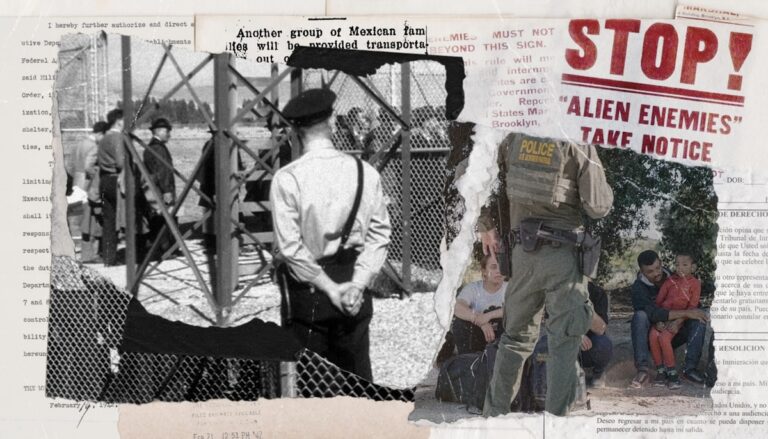By Vanessa Schoning and Devra Baxter for FCNL
President-elect Trump wants to resurrect one of the darkest eras in the country’s history. Congress passed the Alien Enemies Act (AEA) in 1798 as one of the four Alien and Sedition Acts, a policy package to monitor and deport immigrants under the guise of national security. While lawmakers terminated the other three laws, the AEA remains, granting the president sweeping authority to detain, deport, or restrict individuals who are citizens, natives, denizens, or foreign belligerents of specific countries.
The caveat? It only applies during times of war.
Presidents used the law three times, all during military conflicts, to curtail civil liberties. During the War of 1812, President James Madison applied the authority to British nationals, deeming them suspicious as the country battled the United Kingdom.
President Woodrow Wilson employed the AEA for a second time during World War I to target and monitor citizens of the nations that fought against the U.S. During this period, 480,000 Germans were registered as “enemy aliens,” and over 6,000 were transferred to internment camps and held in detention, even years after fighting stopped.
Lastly, and most infamously, during World War II, President Franklin Delano Roosevelt invoked the AEA to target Japanese, German, and Italian Americans. Following the attack on Pearl Harbor, this legislation, coupled with Executive Order 9066, authorized the inhumane detention of 120,000 people of Japanese descent. This violated human rights, tore families from their communities, homes, and businesses, and subjected tens of thousands of people to dehumanizing living conditions. Despite this tortuous history, Trump seeks to employ the AEA a fourth time.
Trump’s Use of the Act Would Have Devastating Consequences
President-elect Trump says he wants to use the AEA to detain and deport millions of noncitizens. He claims that the crossing of migrants at the U.S.-Mexico border constitutes a “invasion.” This is a blatant overreach, as the AEA requires the president to pinpoint a hostile entity, a “foreign nation or government,” as dictated by the law. As floated by Trump’s team, an attempt to label countries the U.S. is not at war with—like Venezuela, or groups, like Mexican cartels—as “foreign enemies” would ignore the mandate of the Act. This would constitute an unprecedented abuse of power, and harm countless non-citizens who have no connection to drug trafficking and aren’t involved in the criminal justice system.
Using the AEA to facilitate mass deportations would indiscriminately harm U.S. communities and immigrant families, bypass due process, and open the door for blatant human rights abuses. This is already clear from the apprehensions and internment camps during previous AEA eras.
Trump‘s promise to invoke the Aliens Enemies Act highlights the urgent need for Congress to reassert its constitutional authority in matters of use of military force and national security.
Trump‘s promise to invoke the Aliens Enemies Act highlights the urgent need for Congress to reassert its constitutional authority in matters of use of military force and national security.
When discussing unchecked war powers, we often focus on the impacts across the globe. Congress has ceded significant authority to the President through overly broad Authorizations of Military Force (AUMF). The 2001 AUMF, for example, has been used to authorize the spread of military force into at least 22 countries and the indefinite detention of 30 prisoners at Guantánamo Bay. During his first presidency, Trump even cited the 2002 AUMF as the authority for the assassination of Iranian general Qassem Soleimani.
Asserting the Aliens Enemies Act, a wartime authority, to rip families apart and deport immigrants would deepen the dangers of unchecked war powers. Invoking the Aliens Enemies Act to monitor, detain, or deport immigrants would be a misuse of military force — a war against U.S. communities.
Invoking the Aliens Enemies Act to monitor, detain, or deport immigrants would be a misuse of military force — a war against U.S. communities.
Broadly painting people of a certain ancestry as “alien enemies” to manufacture a wartime response only encourages anti-immigrant sentiment. It would wreak fear within migrant communities and subject people to violence. If implemented in any capacity, the AEA would expand harmful apprehension and detention practices, uproot immigrants from their communities, tear mixed-status families apart, and allow the President to misuse war powers.
Congress Must Stand Firm Against the AEA.
Unchecked war powers pose a significant threat to the society We Seek, free from war and violence for all. Without proper congressional oversight, presidents can escalate conflict, bypass constitutional safeguards, and disregard civil liberties. Our continued advocacy for restoration of Congress’s constitutional authority to declare war and authorize the use of military force is critical to stopping the spread of U.S. militarism. By repealing the outdated AEA, Congress can prevent further misuse of this wartime authority.


